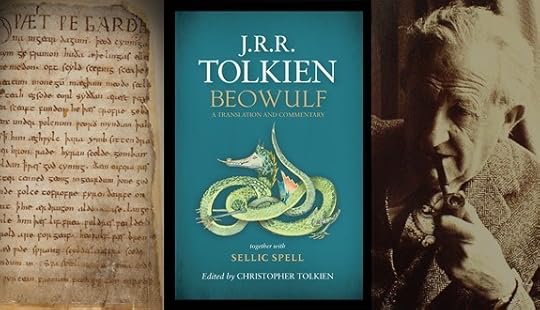Tolkien and Beowulf

Tolkien and Beowulf | Jerry Salyer | Catholic World Report
Tolkien’s newly published translation of the Old English epic beautifully demonstrates that there is more reality in folklore than in the perverse fantasies by which many live today.
At morn King Hrothgar on his throne
for his lieges slain there mourned alone
but Grendel gnawed the flesh and bone
of the thirty thanes of Denmark.
A ship there sailed like a wingéd swan,
and the foam was white on the waters wan,
and one there stood with bright helm on
that fate had brought to Denmark.
— “Beowulf and the Monsters,” J.R.R. Tolkien
Heathen or no, Beowulf does the Lord’s work, and knows full well that there is a higher power to Whom all must answer. So believed the anonymous eighth-century Christian poet who saw fit to set down Beowulf’s adventures; so too believed the late scholar and novelist J.R.R. Tolkien, whose long-awaited translation of the greatest of Old English epics has finally been released.
If Professor Tolkien and the ancient Anglo-Saxon storyteller are right, then Beowulf: A Translation and Commentary(Houghton Mifflin Harcourt, 2014) should interest not only philologists and Tolkien fans but the inquisitive Catholic layman, too. Perhaps northern European folklore is more relevant to the Faith than we might think? Perhaps modern Christians can derive wisdom and inspiration from what Tolkien called “point[s] of contact between Scripture and Germanic legend”?
In Tolkien’s view, the first noteworthy “point of contact” is manifested through the Beowulf monsters—particularly the ogre Grendel. By terrorizing the realm of the good King Hrothgar and devouring Hrothgar’s subjects at night, Grendel stands as a representative of Cain, that first killer from whom, in the Beowulf mythos, “all evil broods were born, ogres and goblins and haunting shapes of hell, and the giants too, that long time warred with God.”
What attracts Grendel’s hostility is the music coming from Heorot, as the sound of Hrothgar’s minstrel singing joyfully of Creation rings hatefully in the creature’s ears. This loathing for Christian civilization is extremely important for understanding the poem, for as Tolkien observes in his commentary on the Old English text Grendel is the ultimate féond(enemy), in a permanent state of enmity—fæhÞ—with mankind:
Carl E. Olson's Blog
- Carl E. Olson's profile
- 20 followers



